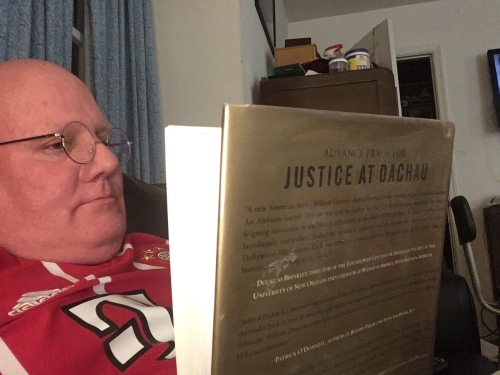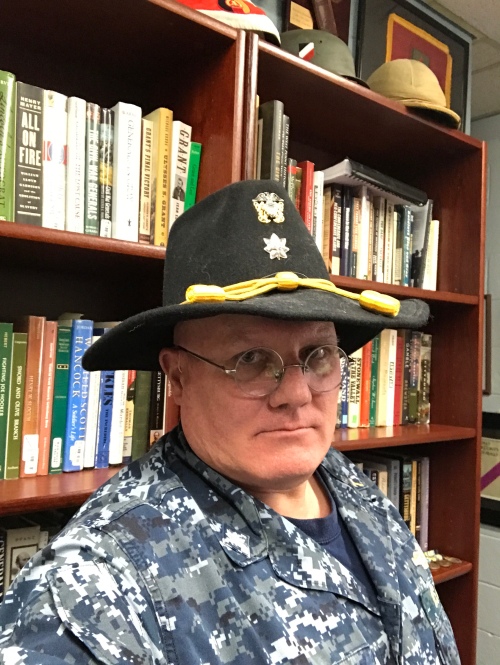
The Late Burgess Meredith in the Twilight Zone Episode “Time at Last”
Friends of Padre Steve’s World,
George R.R. Martin wrote in his book A Dance With Dragons: “A reader lives a thousand lives before he dies, said Jojen. The man who never reads lives only one.”
I constantly read and because I try to imagine what I am reading so that in a way I live it. I have been to places that have never traveled to before and on entering them I know exactly where everything is and what happened there. I remember leading a group from my Army chapel in Wurzburg Germany to Wittenberg, where Martin Luther began the Protestant Reformation. As I led the group through the town a couple of people asked me how many times I had been there. I told them, “physically, never until today, but I have been here a thousand times before because of books. I saw Wittenberg in my minds eye before I ever saw the city.” They were surprised and both said that it seemed like I had been there many times.
I have had the same thing happen other places that I have visited, and again, it is because I read, and as I read, I imagine and occasionally dream. I do not need virtual reality to take me places I have never been. For me it is enough to read, look at pictures or paintings, and study maps. Those actions allow me to see and imagine people, places, and things more than any virtual reality program can do, because the mind is so much more powerful in imagining what was simply by reading, studying, and closing our eyes. Then when we actually get to the place we know it, we know the people who were there, we know where they lived, and what they thought. It really is quite amazing which is why I love readying history and biography so much. The late astronomer Carl Sagan wrote: “One glance at a book and you hear the voice of another person, perhaps someone dead for 1,000 years. To read is to voyage through time.”
I have a huge number of my books in my office most dealing with the history, especially the American Civil War and Reconstruction, the World Wars, and the insurgencies and counter-insurgency wars of the past seventy or so years. I have a lot of biographies, books on American history, military theory, sociology, philosophy, psychology related to war and PTSD, and a few theological works, of which most are in my home library which doubles as a guest room.
When I had an office outside the house long with mementos of my military career, other militaria, artwork, and baseball memorabilia the sight and smell can be both overwhelming and comforting at the same time. I hear that a lot from my visitors, including those who come in for counseling, consolation, or just to know someone cares. They tell my visitors volumes about me without them ever asking a question or me telling them, and occasionally someone will ask to borrow a book, and most of the time I will lend them the book, or if I have multiple copies even one to them.
In a sense my books are kind of a window to my soul, the topics, and even how I have them organized, and they are not for decoration. Many times while I am reflecting on a topic, a conversation, or something that I read in the news I peruse my books and pull one or more out to help me better understand it, or relate it to history. sometimes when in conversation something will come up and I can pull out a book. A Chaplain who once served with me said that he should “apply for graduate credit” for what he learns in our often off the cuff talks. But, for me that is because I read so much and absorb it. Joyce Carol Oates wrote: “Reading is the sole means by which we slip, involuntarily, often helplessly, into another’s skin, another’s voice, another’s soul.” That is something I have come to understand over the decades.
Likewise my memorabilia is there to remind me of all the people in my past who I have served with. I don’t have all my medals, honors, and diplomas up for everyone to see, instead I have pictures and collages, many signed by people who made a difference in my life. When I see the signatures and often all too kind words on them I am humbled, and in some cases a tear will come to my eye, but I digress…
I always try to read a decent amount everyday. I in the past couple of weeks I have finished reading a number of very good books dealing with different historical dramas. I have mentioned a number of my recent reads. Last year I read a very good book called Hidden Horrors: Japanese War Crimes In World War II, by Yuki Tanaka. The book is primarily focused on Japanese War Crimes In the Southwest Pacific against Allied POWs, civilians, including German missionaries, and indigenous peoples. I will be referring to it in future articles as I deal with Japanese War Crimes In the Second World War. I am well versed in the Nazi War crimes and only somewhat familiar with Japanese war crimes, but the the takeaway from the book was that both the German War Crimes and Japanese War Crimes committed during the Second World War were committed by men who placed unconditional loyalty to a supreme leader, in the case of the Germans, Hitler’s Fuhrer cult, and in the case of the Japanese, Emperor worship, much like the present day Trump Cult. But I digress, I will go into that in a future article. This week I completed Dr Timothy Snyder’s latest book “Our Malady: Lessons in Liberty from a Hospital Diary, and I am working on the second volume of Volker Ullrich’s biography of Hitler. Due to spending so much time on my book before having my own medical-dental crisis I am behind in much of the ready I plan to do.
I love reading and writing about complex characters, people who may be heroes and at the same time scoundrels. I like the contradictions and the feet of clay of people, because I am filled with my own, and truthfully saints are pretty boring. Unfortunately, until Ullrich’s haven’t read any biographies of late although I have several waiting in my stack of books. Much of my reading deals a lot with biography as the characters weave their way through history. By reading about them I often feel that I get to know them better than some of the people they actually associated because most people only reveal select aspects of themselves and their thoughts, even to close friends.
Two years ago we observed the Centenary of the end of World War One. As a result I re-read Edmond Taylor’s The Fall of the Dynasties: The Collapse of the Old Order, 1905-1922 and Richard Watt’s The Kings Depart: The Tragedy of Germany: Versailles and the German Revolution. Both of these are very important reads which should help us to reflect reflect on what is happening in our world today. There are many similarities and reading them causes me to wonder if world leaders will allow hubris, arrogance, greed, and pride to drag the world into another catastrophic war. Sadly President Trump, doesn’t read, and doesn’t learn from history. Unfortunately, his ignorance is very much a reflection of our twenty-first century media culture.
But to me, books are important, far more important than anything that is shouted at me on television. Unfortunately, the latter is how most people get information today. I often sit at the bar and on quiet days simply listen to those near me repeat ad-nauseam the bullshit echoed by badly educated and historically ignorant conservative pundits, usually from Fox News. Historian Timothy Snyder wrote in his little but profound book, On Tyranny:
“Staring at screens is perhaps unavoidable, but the two-dimensional world makes little sense unless we can draw upon a mental armory that we have developed somewhere else. When we repeat the same words and phrases that appear in the daily media, we accept the absence of a larger framework. To have such a framework requires more concepts, and having more concepts requires reading. So get the screens out of your room and surround yourself with books. The characters in Orwell’s and Bradbury’s books could not do this—but we still can.”
Likewise, Barbara Tuchman wrote:
“Books are the carriers of civilization. Without books, history is silent, literature dumb, science crippled, thought and speculation at a standstill. Without books, the development of civilization would have been impossible. They are engines of change (as the poet said), windows on the world and lighthouses erected in the sea of time. They are companions, teachers, magicians, bankers of the treasures of the mind. Books are humanity in print.”
But anyway, I retire from the Navy soon and writing, reading, and teaching will become more and more part of my life. I am happy about that. Carl Sagan wrote:
“What an astonishing thing a book is. It’s a flat object made from a tree with flexible parts on which are imprinted lots of funny dark squiggles. But one glance at it and you’re inside the mind of another person, maybe somebody dead for thousands of years. Across the millennia, an author is speaking clearly and silently inside your head, directly to you. Writing is perhaps the greatest of human inventions, binding together people who never knew each other, citizens of distant epochs. Books break the shackles of time. A book is proof that humans are capable of working magic.”
I hope that the books I write do what Sagan wrote about, and that by teaching I can encourage others to break away from the two dimensional screens that hold them captive and return to books where imagination can flourish and take us places we only hope to go.
Have a great day and better tomorrow tomorrow, stay safe and pick up a book and read.
Peace
Padre Steve+













